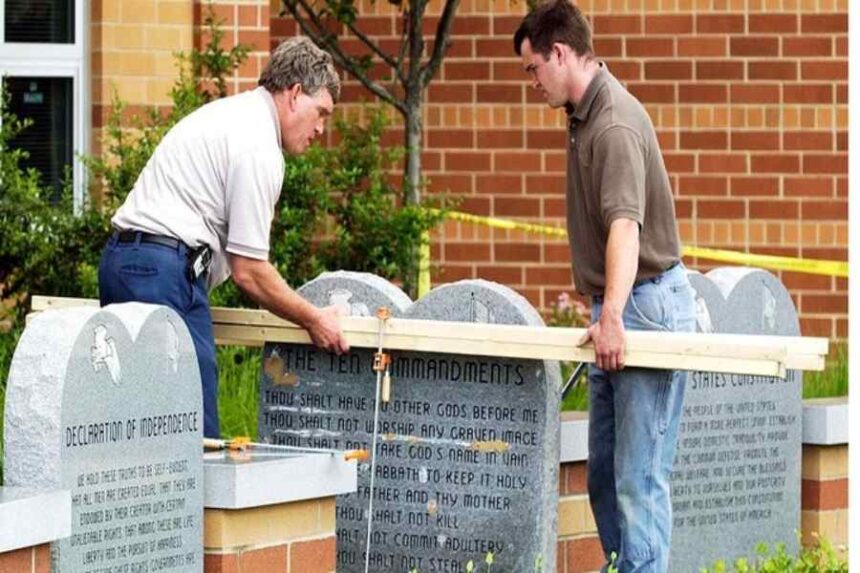In a pivotal development highlighting the growing ideological split across the United States, Texas Lieutenant Governor Dan Patrick has committed to advancing legislation that mandates the display of the Ten Commandments in public school classrooms throughout the state.
This commitment follows Louisiana’s controversial decision to become the first state to require such displays, which ignited a fierce debate over the implications for the constitutional separation of church and state.
Patrick’s pledge reflects personal or state-level ambitions and signifies a broader national movement among conservative leaders to integrate certain religious elements into public education.
This move has intensified discussions around religious freedom and the role of government in regulating religious expressions, bringing to the forefront questions about the foundational principles of American governance and the rights of individuals in a diverse society.
As this debate unfolds, it serves as a litmus test for the nation’s enduring struggle to balance deeply held beliefs with a commitment to upholding secular and inclusive public institutions.
The Legislative Push
The legislative effort spearheaded by Texas Lieutenant Governor Dan Patrick, through the proposed bill SB 1515, aims to embed a religious dimension into the educational framework of public schools across the state.
This bill, if passed, would require that the Ten Commandments be prominently displayed in every public elementary and secondary school classroom in Texas. Patrick’s firm commitment to reintroduce and advocate for the passage of this bill in the upcoming legislative session marks a concerted push to infuse religious principles directly into public education settings.
This initiative reflects a broader trend observed in several conservative states nationwide, with a growing movement to incorporate religious elements more explicitly into public institutions.
Proponents often justify these efforts as a return to what they consider foundational American values rooted in Judeo-Christian principles.
The push for SB 1515 is part of a larger cultural and political endeavor to reshape the role of religion in public life, particularly in the education system. It signals a significant shift towards more overtly aligning state education policies with specific religious ideologies.
Background and Controversy
The legislative initiative in Texas closely follows a recent development in Louisiana, where Governor Jeff Landry enacted a law mandating the display of the Ten Commandments in every classroom, effective from the upcoming school year.
Louisiana’s move has been championed by its supporters as a tribute to what they view as the foundational cultural and legal heritage of the United States.
They argue that such displays can provide moral guidance and educational benefits to students, linking modern legal systems to historical documents.
However, this law has also ignited substantial controversy and opposition. Civil liberties groups such as the American Civil Liberties Union (ACLU) and Americans United for Separation of Church and State have vociferously criticized the mandate.
They contend that it represents a clear breach of the Establishment Clause of the First Amendment, which prohibits the government from establishing an official religion or unduly favoring one religion over others.
These organizations argue that the mandatory display of the Ten Commandments in public schools imposes religious views on students, thereby undermining the constitutional separation of church and state.
They have initiated legal challenges, asserting that the law is not only unconstitutional but also divisive, as it could alienate non-Christian students and parents, reflecting broader societal debates over the role of religion in public spaces.
Political Implications
The legislative efforts in Texas and Louisiana to mandate the display of the Ten Commandments in public school classrooms have rapidly escalated into a significant political issue, encapsulating the ongoing national discourse on the role of religion in public spaces.
This development has drawn the attention of key political figures, including former President Donald Trump, who lauded Louisiana’s law as a pivotal move towards a broader religious revival in the United States.
Trump’s endorsement reflects and amplifies a prevailing sentiment among his Christian conservative base, who view such measures as crucial in restoring what they believe to be America’s moral foundation.
In Texas, the reintroduction of this bill by Lieutenant Governor Dan Patrick is strategically timed to resonate with conservative constituents, potentially bolstering support in upcoming elections. This move, however, does not come without its controversies.
It has stirred apprehension among liberals and secularists who argue that such a mandate infringes upon the separation of church and state as outlined in the U.S. Constitution.
They contend that imposing a religious code in educational settings encroaches on federal protections and could marginalize non-Christian students and families, thereby deepening divisions within communities.
This contentious issue highlights the delicate balance policymakers must navigate between respecting religious freedoms and upholding constitutional safeguards in an increasingly diverse society.
The bill’s journey through the Texas legislature has been fraught with challenges. During the last session, despite passing the Senate, SB 1515 was stalled in the House due to inaction from House Speaker Dade Phelan, whom Patrick publicly criticized for the bill’s failure. The discord between Patrick and Phelan hints at internal Republican disagreements that could complicate the bill’s prospects.
Legal and Educational Perspectives
Legal experts and educators are closely watching these developments, concerned about the potential for coercion in a classroom setting where minors might feel pressured by religious displays.
Notre Dame Law School Professor Richard W. Garnett suggested that the Supreme Court’s evolving doctrine would be a significant factor in determining the legality of such measures, especially given the Court’s recent rulings on religious freedom and public education.
As Texas prepares for its next legislative session, the debate over SB 1515 promises to intensify. Similar bills are considered in other states like Oklahoma and Utah, and the outcome in Texas could set a precedent, influencing national policy discussions about religious expression in public institutions.
The discussion concerns not only the legal viability of such laws but also their implications for America’s pluralistic society.
As the nation grapples with these questions, the Texas legislature’s actions will be a critical bellwether of the country’s direction regarding the balance between religious freedom and the secular nature of state governance.






